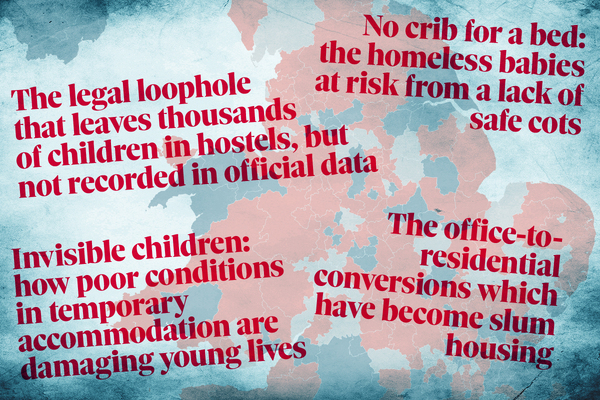Filming homelessness
Thinking of entering our Reel Homes competition? Film director Michael Chandler provides tips on how to capture experience of homelessness on screen
Capturing the many diverse experiences of homelessness, and doing justice to that experience, is a challenge, regardless of whether you intend to dramatise that experience or capture it through a documentary.
If you are choosing to capture the experience through drama, the bar has been set high. Cathy Come Home arguably remains the most powerful on-screen portrayal about the homeless experience. The key challenges really revolve about the issues of honesty, authenticity, and creating a realistic multi-dimensional portrayal – and in this case of the Reel Homes competition, in the time limitation of 20 minutes.

Creating an honest, authentic film, which neither romanticises, is fearful or causes offence is a challenge. It is very easy to create sloppy generalisations and slip into stereotypes, over-simplify stories and avoid some of the uglier truths of the situation of the individuals and their stories. There is no one single journey to homelesssness – and no one single unifying experience of homelessness.
As an example, Transient was an early feature film script about homelessness I submitted to a British Film Institute competition. It was rejected because it was unrelentlessly bleak, and had no light or shade.
My initial response at the time was that there is no light in the circumstances. But there is often occasional light, even if it comes in the form of the darkest humour. Even Cathy Come Home starts off full of light and hope, and some of the later scenes, in the caravan community and the halfway house, have smiles and laughter.
Linked to this is the challenge of making it believable. Depending who your audience is, if they don’t know these things happen, they won’t believe. And it is often the minutiae in these experiences that you could never guess or anticipate without speaking to someone who’s been through it, that really then bring the stories to life.
A key recommendation here – both in my experience writing scripts and my time hearing and sharing stories at Cardboard Citizens – is the need to do proper research. Talk to people who have experienced homelessness. Better still, have actors with lived experiences. From both my experience as a film-maker and at Cardboard Citizens, I would always advocate having people with lived experience in the drama where possible.
In many ways, it’s easier to capture the reality of the issues and individuals through a documentary – it’s working for us with From Street To Stage, bringing to life the diversity and reality of the individuals and issues. But this poses some very different, and often greater challenges, ethically and practically.
ABOUT REEL HOMES
The Reel Homes film competition is looking for new, up-and-coming film-makers to produce a short film about homelessness or the housing crisis.
The winner will be picked by a panel of both housing and film-making professionals and win a £1,500 cash prize. They will also receive funding to help develop a final short film, which will receive a public showing and wider promotion. The winning film of about 20-25 minutes in length will be entered in at least one film festival. To enter click here.
The key challenge, and priority, is around consent and respecting boundaries – both now, and in the future. You will be capturing people at what will possibly be their lowest moment, and many people will understandably not want that. We’ve had to handle this with great tact and understanding, being clear about what the aims and intended circulation of the film were. Even then, some participants didn’t want to be heavily featured, and people’s rights and consent have to be respected, even if it means you cannot capture what may seem to be the most interesting story. Allow them to tell their story, their way.
Another challenge is around planning, given many homeless people’s hugely uncertain situations. Both for From Street To Stage and other similar film projects, dates and times of shoots regularly changed as homeless people were moved around, lost their phones, had to deal with last-minute emergencies, or simply didn’t show up.
“Film is one of the most powerful way of showing and sharing stories, particularly on a mass scale.”
Another is safety – of yourself, your crew and those you are filming. Wilderness has filmed homeless communities in Sierra Leone and Las Vegas, as well as the UK, and safety was a key issue for the crew, until those being filmed got to know and trust the crew. This took time. And depending on the location, you may be working in an environment away from the normal securities – phone signals or help nearby. Working with people who may have mental health or addiction issues, and knowing what to do if something happens, can be difficult as well. Consider working with the support of a trained organisation, who already have relationships with the homeless clients you’re documenting.
FROM STREET TO STAGE
Click here for a preview of Wilderness Productions’ From Street to Stage documentary, which celebrates the 50th anniversary of Cathy Come Home
Then there is a typical documentary-maker dilemma: observation versus incentivisation – is it enough to film participants in the hope that the programme will help ‘change something’, without offering something to those that are participating as an incentive?
Film is one of the most powerful ways of showing and sharing stories, particularly on a mass scale. And homelessness is an issue that is urgent, growing, experienced by an increasing number, and, for many, devastating. Yet for many others, it remains misunderstood, oversimplified, or ignored entirely. Your film can help raise that awareness and create a sense that change is needed – if you can navigate the challenges along the way, you could well have a modern day Cathy Come Home. Good luck!
Michael Chandler, programme director at Cardboard Citizens, the homeless theatre company and film director at Wilderness Productions










